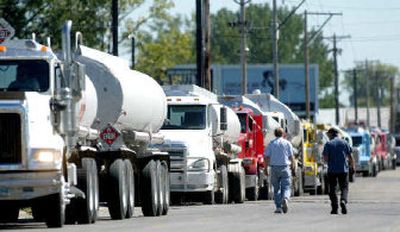Katrina to ripple through U.S. economy

Natural disasters ripple through the economy for weeks, as suffering in one region or industry leads to profit in another.
Most hurricanes actually boost economic activity because of reconstruction spending. But the effects of Hurricane Katrina are especially complex, economists say, due to the concentration of shipping and energy production in the area hit hardest: Louisiana, Mississippi and Alabama.
In the near term, prices will rise for goods that are bottlenecked because of port closures.
The potential damage to oil platforms, refineries and pipelines that remain closed along the Gulf Coast drove energy prices to new highs Tuesday, with crude futures briefly topping $70 a barrel and wholesale gasoline costs surging to levels that could lead to $3 a gallon at the pump in some markets.
John Silvia, chief economist at Wachovia in Charlotte, N.C., said, “For the next three to four weeks there’s the potential of $3-a-gallon gasoline, but then prices will probably come back to the $2.70, $2.80 range.”
Aftershocks may continue to reverberate in surprising places.
Once federal aid and insurance payments start pouring into the region, demand will soar for construction materials and workers. Prices could rise at companies like Lowe’s and Home Depot, and other regions of the country could see a shortage of contractors.
“Retailers and the companies producing materials that are sold through them, those will all do well,” said Nigel Gault, chief U.S. economist for the research firm Global Insight, based in Lexington, Mass. “The entire construction industry will do well, and therefore it will be a boon for construction employment. It will suck construction workers into that part of the country. That potentially is a negative to other parts of the country.”
Hurricane Katrina could cost the insurance industry up to $25 billion in claims, which would make it the costliest storm in the nation’s history, according to updated reports Tuesday from risk assessment firms.
Record-setting Hurricane Andrew in 1992 caused some $15.5 billion in insured losses. Adjusted for inflation, Andrew’s cost would be nearly $21 billion today.
The figures do not cover property that isn’t insured, which could add billions to the total. The Insurance Information Institute said that in Andrew’s case, the uninsured losses may have approached $16 billion.
Other companies have put out lower estimates for the impact of Katrina on the insurance industry, and all emphasize that data is preliminary because research teams have been unable to get into hard-hit areas to do onsite inspections.
Southern ports that escaped the brunt of the hurricane, such as Charleston, S.C., may benefit as shippers seek alternatives.
Still, the local economy will struggle for months, and some especially hard-hit areas may never recover. Tourism, travel and gaming will suffer.
Hurricane Katrina dealt Gulf Coast casinos a devastating hand, destroying several properties and crippling the region’s gambling industry for months, if not years to come until the companies can rebuild their operations.
The effect on the Mississippi economy could be severe. About 14,000 people work in the dozen casinos along the Mississippi coastline. Each casino has a land-based hotel. Last year, Mississippi casinos generated $2.7 billion in revenues.
“On a very human level, people’s jobs may be washed away. They may have worked in restaurants and shops that no longer exist,” said Robert Hartwig, chief economist for the Insurance Information Institute in New York. “There’s an enormous human element to this that goes beyond the dollars and cents of insured losses.”
How much the hurricane ends up harming the U.S. economy overall will hinge on one factor: how long it takes to get oil refining and the ports back online, experts said.
The production and distribution of oil and gas remained severely disrupted by the shutdown of a key oil import terminal off the coast of Louisiana and by the Gulf region’s widespread loss of electricity, which is needed to power pipelines and refineries.
Plus, “If New Orleans is uninhabitable for months, then there are no workers for the port, there are no workers for the refineries,” said George Friedman, chairman of Stratfor, an Austin, Texas, security consulting company.
The Port of South Louisiana, along the Mississippi upriver from New Orleans, is the top U.S. port by volume, handling 249 million tons in 2004, and New Orleans is No. 5. Commodities such as crude oil, rubber, metals, coffee and lumber come in for transportation up the Mississippi River, while grains and petroleum products go out to the world.
“The American Midwest feeds the world,” Friedman said. “This has potential global consequences if the river is impassable for an extended period of time or if the port facilities are so damaged they can’t be used.”